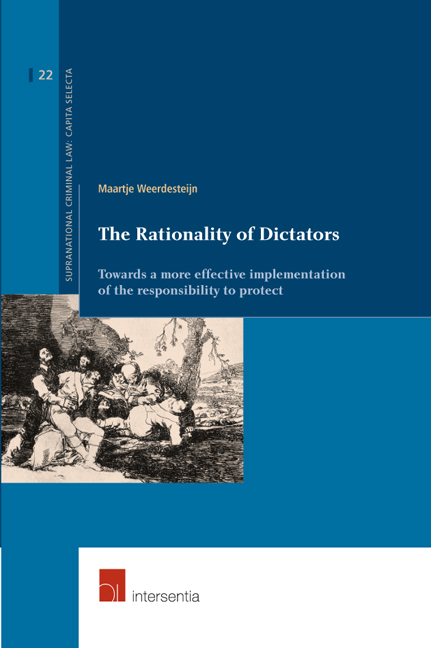 The Rationality of Dictators
The Rationality of Dictators Book contents
- Frontmatter
- Acknowledgements
- Contents
- Chapter 1 Introduction
- Part I The Theory
- Part II The Comparative Case Study
- Chapter 7 Pol Pot and the Destruction of Cambodia
- Chapter 8 Milosevic and the Dissolution of Yugoslavia
- Chapter 9 The Rationality of Pol Pot
- Chapter 10 The Rationality of Milosevic
- Chapter 11 Military Intervention: Lessons Learned from the Wars with NATO and Vietnam
- Chapter 12 Lessons Learned for the Implementation of the Responsibility to Protect
- Chapter 13 Conclusion: A Piece of the Puzzle
- References
Chapter 7 - Pol Pot and the Destruction of Cambodia
from Part II - The Comparative Case Study
Published online by Cambridge University Press: 28 September 2018
- Frontmatter
- Acknowledgements
- Contents
- Chapter 1 Introduction
- Part I The Theory
- Part II The Comparative Case Study
- Chapter 7 Pol Pot and the Destruction of Cambodia
- Chapter 8 Milosevic and the Dissolution of Yugoslavia
- Chapter 9 The Rationality of Pol Pot
- Chapter 10 The Rationality of Milosevic
- Chapter 11 Military Intervention: Lessons Learned from the Wars with NATO and Vietnam
- Chapter 12 Lessons Learned for the Implementation of the Responsibility to Protect
- Chapter 13 Conclusion: A Piece of the Puzzle
- References
Summary
INTRODUCTION
After Pol Pot rose to power in 1975, his regime inflicted unimaginable horrors on the population in an attempt to transform society in accordance with his communist ideology. Before he was removed from power four years later, his regime had starved, executed and worked to death up to a quarter of the population (Chandler, 1999, p. 4; Kiernan, 2003, p. 587). Throughout its history, Cambodia's fate has been intertwined with that of its neighbours. When the war in Vietnam started in 1960 this had far reaching consequences for Cambodia as well (Becker, 1998, p. xv; 1). Both sides in the war, the communist as well as South Vietnamese and US forces, used Cambodian territory as their battleground (Kiernan, 2002, p. 485). The United States decided to heavily bomb the Cambodian countryside from 1969 to 1973 to target communist sanctuaries, with devastating effects on those living there (Becker, 1998, pp. 16-17; Kiernan, 2002, p. 485; Short, 2004, p. 182; 215). Pol Pot rose to power amidst this chaos, determined to free his country from foreign influence (Becker, 1998, p. 16; K. D. Jackson, 1989, p. 41). Cambodia was frequently seen by its political leaders ‘as one of history's great victims’ (Becker, 1998, p. xv). After an era of greatness between the 9th and the 15th centuries, Cambodia's territory by the time the Khmer Rouge came to power spanned only a fraction of what it once was and the Khmer Rouge sought to restore the country's former glory (Chandler, 1998, pp. 12-14). Pot changed the name to the country to Democratic Kampuchea, favouring its indigenous pronunciation over the westernised ‘Cambodia’ (Pina e Cunha, Rego, & Clegg, 2011, p. 272).
While Cambodia has always had the reputation of being a gentle and kind nation, like so many other countries, it has a violent history in which despotic rulers provoked and fought unending wars. When one takes this into consideration the horrors of the Khmer Rouge are hardly an aberration in its history (Becker, 1998, p. xv; A. Jones, 2011, p. 283; Vickery, 1984, pp. 7-9). Its past continued to be important for its population and, as will be explained below, the history and corresponding animosities between different groups in the country shaped Pol's genocidal policies.
- Type
- Chapter
- Information
- The Rationality of DictatorsTowards a more effective implementation of the responsibility to protect, pp. 173 - 206Publisher: IntersentiaPrint publication year: 2016


